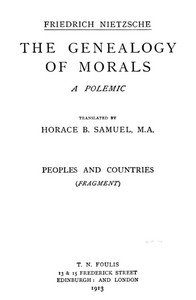| Author |
Nietzsche, Friedrich Wilhelm, 1844-1900 |
| Editor |
Levy, Oscar, 1867-1946 |
| Translator |
Kennedy, J. M. (John McFarland) |
| Translator |
Samuel, Horace Barnett, 1883-1950 |
| Uniform Title |
Zur Genealogie der Moral. English
|
| Title |
The Genealogy of Morals
The Complete Works, Volume Thirteen, edited by Dr. Oscar Levy.
|
| Note |
Also contains: Peoples and Countries (fragment).
|
| Credits |
Produced by Marc D'Hooghe (Images generously made available by the Hathi Trust.)
|
| Summary |
"The Genealogy of Morals" by Friedrich Wilhelm Nietzsche is a philosophical polemic written in the late 19th century. This work examines the origins and evolution of moral values, particularly the concepts of "good" and "evil," and presents a critique of traditional moral values shaped by ascetic ideals and resentment. Nietzsche seeks to uncover the historical contexts in which these moral prejudices developed, exploring their implications for human behavior and the concept of morality itself. The opening of "The Genealogy of Morals" introduces Nietzsche’s examination of self-knowledge and the historical roots of our moral judgments. He reflects on humanity's struggle to understand the origins of concepts like "Good" and "Evil," suggesting that philosophical inquiries into morality often fail due to a lack of historical and psychological insight. Nietzche conveys his intention to dissect moral values, contrasting aristocratic values, which he associates with nobility and strength, against the slave morality that arises from ressentiment, or resentment from the weak. This exploration leads to a deeper understanding of the motivations behind moral judgments and the complexities of human psyche shaped by culture and history. (This is an automatically generated summary.)
|
| Language |
English |
| LoC Class |
B: Philosophy, Psychology, Religion
|
| Subject |
Ethics
|
| Category |
Text |
| EBook-No. |
52319 |
| Release Date |
Jun 13, 2016 |
| Most Recently Updated |
Apr 2, 2024 |
| Copyright Status |
Public domain in the USA. |
| Downloads |
6298 downloads in the last 30 days. |
|
Project Gutenberg eBooks are always free!
|

